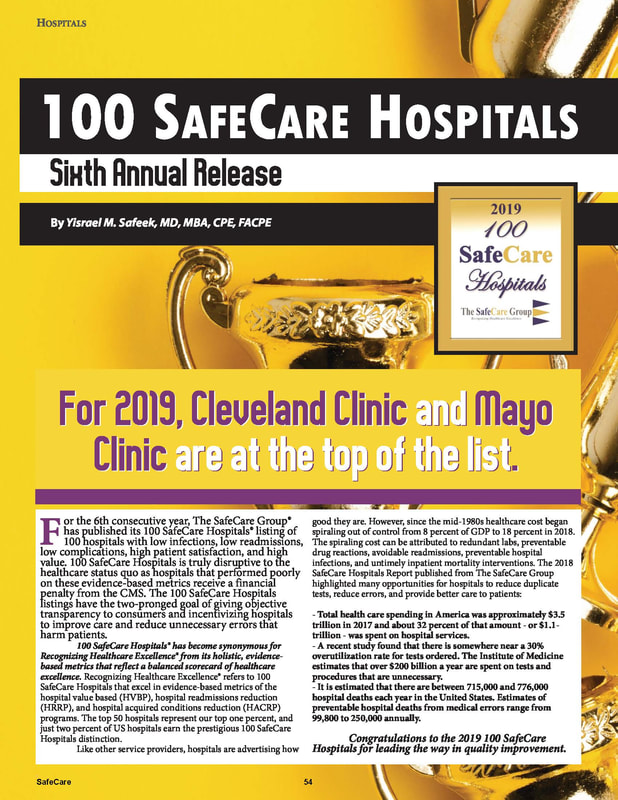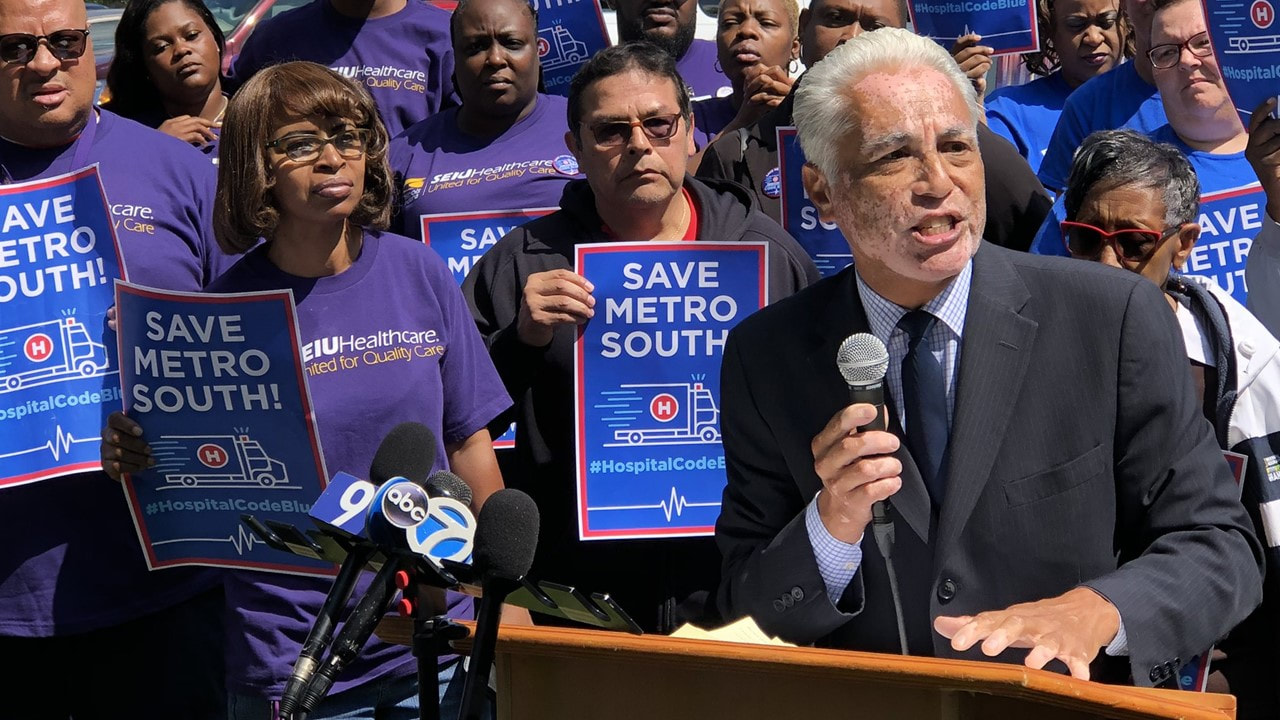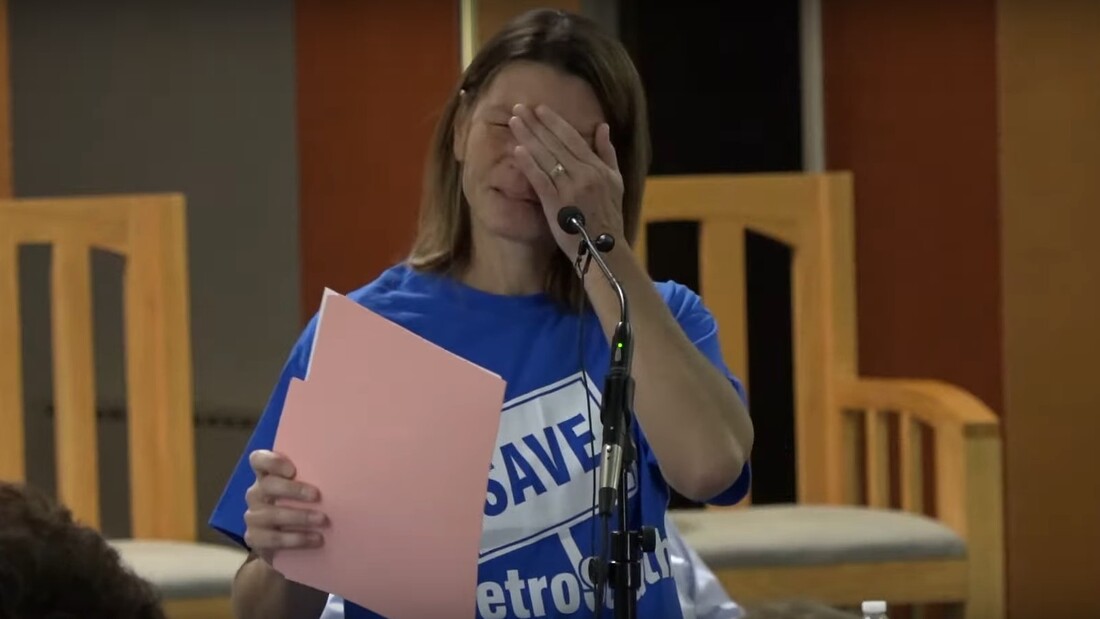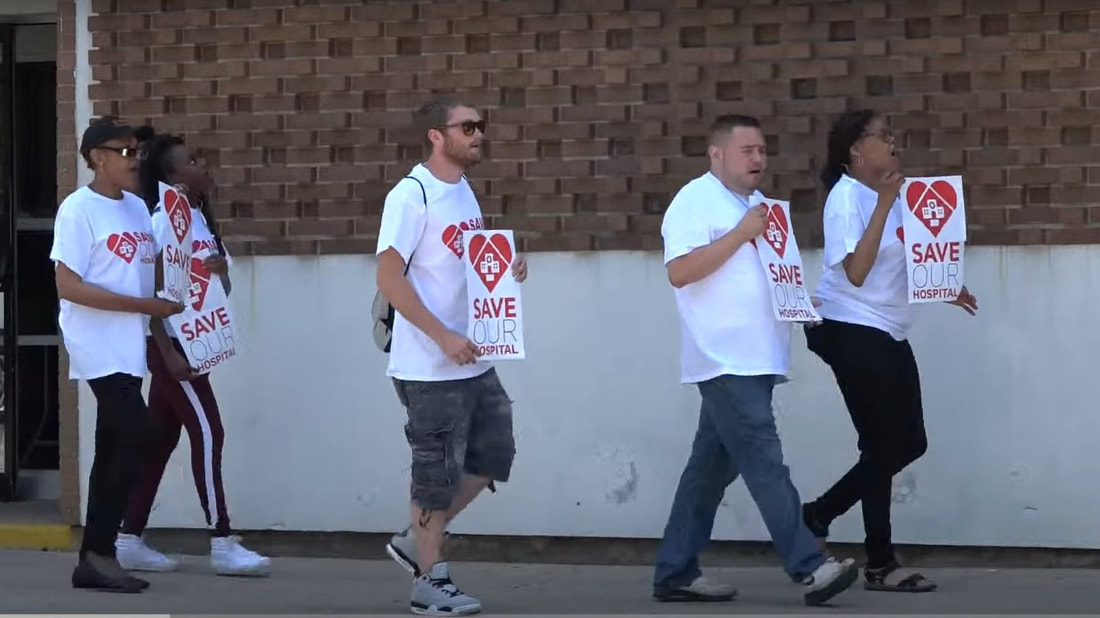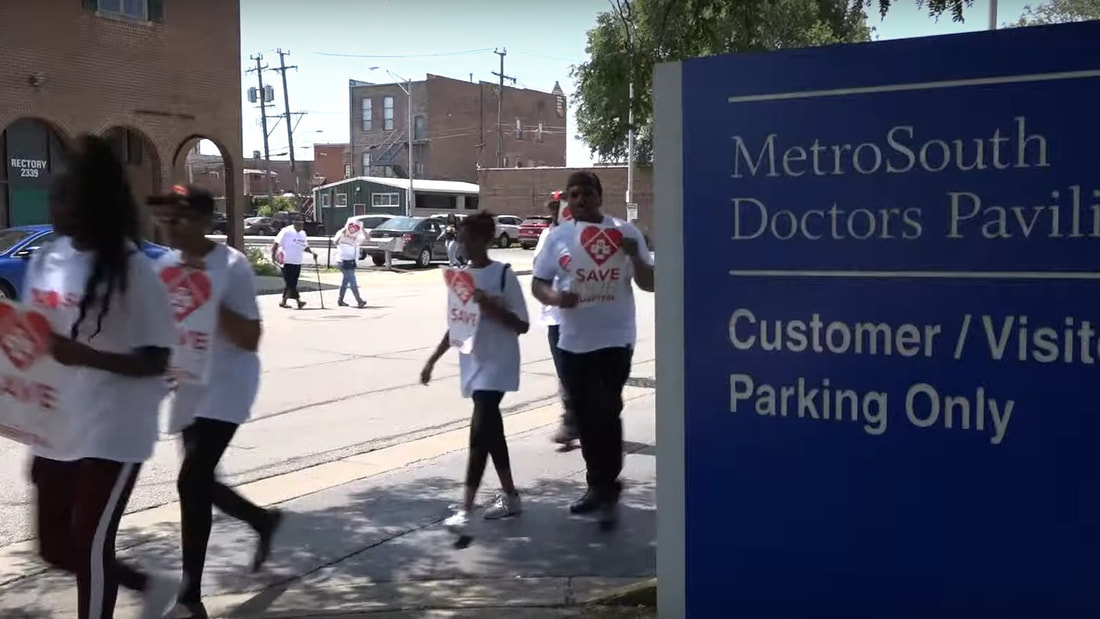Featured
|
100 SafeCare Hospitals
View charges, infections, complications, deaths, and readmissions ratings of hospitals Cleveland Clinic and Mayo Clinic are at the top of the list. |
USA
August 12, 2019
August 12, 2019
Quorum Healthcare recently announced closure of MetroSouth Medical Center in Blue Island resulting in an healthcare shock to the city.
Yisrael Safeek, MD, MBA: Welcome Mayor Vargas. On April 9th, 2013, residents of the City of Blue Island elected their first new mayor in nearly three decades. Blue Island Independent Party candidate Domingo Fabian Vargas, JD a lifelong resident of Blue Island, was elected to office with 2,090 votes, or 61.8 percent of votes. An alderman for the 7th Ward of Blue Island since 1991, you are an attorney in private practice in Chicago. Born and raised in Blue Island, you earned your Doctor of Juris in Constitutional Law from Loyola University Chicago. During the Clinton Administration, you was invited to the White House as a guest of the U.S. Hispanic Leadership Institute and was invited to attend a safety and health services conference in Philadelphia at the invitation of the National Association of Latino Elected Officials. As Mayor, your leadership has enhanced Blue Island healthcare in many ways, most notable instituting a change of employee health insurance carriers, saving the City millions of dollars. Now, you are facing closure of proprietary-owned MetroSouth Medical Center. How was the community informed about the hospital closing?
Mayor Domingo Vargas, JD: In June the 18th, 2019, we, as a city, received notification from the present owners of the hospital that they were in the process of closing it November, December of this year. Immediately after that, I had the staff here at the City of Blue Island get in contact with all the elected officials from local county, state, all the way up to Washington, DC. That's how we got the word out that way. And then, we did a news release for the media to get them involved. The media picked up on that within probably minutes after we had submitted our official press release from the city. And then, word spread amongst the residents of Blue Island, and that's how we got it out. And then, from there it's just snowball.
Mayor Domingo Vargas, JD: In June the 18th, 2019, we, as a city, received notification from the present owners of the hospital that they were in the process of closing it November, December of this year. Immediately after that, I had the staff here at the City of Blue Island get in contact with all the elected officials from local county, state, all the way up to Washington, DC. That's how we got the word out that way. And then, we did a news release for the media to get them involved. The media picked up on that within probably minutes after we had submitted our official press release from the city. And then, word spread amongst the residents of Blue Island, and that's how we got it out. And then, from there it's just snowball.
YS: Tell us about support in the community to keep hospital open.
DV: Well, let's put it this way. Besides the initial response that we've had now, only from the people who work for the city and the residents who live around here, the people who use it and the employees and surrounding communities. Our main thing is to keep putting the pressure, and they have been very supportive. We've had an event here on July the 11th. We invited a lot of the stakeholders, both residents and elected officials, business people, people who work at the hospital, first responders and medical personnel. So, that was the initial one.
After receiving our demand for a public hearing on the proposed closure of the MetroSouth Medical Center and the need for a fully functioning hospital in the region, the Illinois Health Facilities and Services Review Board agreed to conduct a public hearing on Wednesday, July 24th. We had the second meeting. That was more of a public comment. Starting from 10:00 in the morning to 6:00 PM, there was testimonials from residents, from doctors, from pastors, local business owners…they came and spoke, including myself.
YS: How will the closure of the hospital affect the Blue Island community?
DV: Well, let's put this way. Back in its heyday, the hospital employed close to 1500 employees, lots of them from the Blue Island area or the surrounding suburbs. Now, approximately half of that – approximately 800 probably employees - again, from Blue Island and surrounding communities are working there. Let's put this way- It would be a domino effect because a lot of the businesses in Blue Island depend on it - from restaurants to the dry cleaners, car washes, gas stations, etc. So, it would be one thing after another. They would have a supplemental or another effect on it as a result of it closing.
YS: How do the local doctors feel about the hospital closing?
DV: I think they're highly disappointed that it's in the process of closing or what they hear of it closing. I know there's a lot of support from the medical personnel, both from the doctors and nurses and everybody else who works in conjunction with the staff there in the hospital. Their commitment, from my understanding, is to the present hospital, whether with new ownership, etc. They don't want the hospital close. They're doing their best thing to try to keep it open and being positive that the hospital remains open.
As I said, there is one group out there who, prior to June 18th, had been negotiating. They're in the process hopefully of finalizing the deal. If that falls through, we know there's other people in line for that. Hopefully, we will not allow this hospital close. I think long term of it is there's going to have to be a new model of a hospital. Maybe as this hospital has been innovative in years past, it's going to be set the trend probably of a new model of a hospital with multifaceted, multipurpose in one building.
YS: Was it small size and low occupancy, for profit ownership, failed hospital management strategies lead to decision to close?
DV: I think it's a little bit of everything. Again, given everything with the Obamacare, nothing against that. You would think as a result of that new policy, that there would be people who would be able to pay and services will be provided. Payment for the services rendered, that's one thing. But again, I think there's still a lot of people out there who are not registered or who don't have insurance; that's one.
Number two, the laws that have changed as to Medicaid or Medicare, not only state, but national. And then, for profit, that's another thing. The bottom line is the money. And maybe as a result, they'll do cuts here, and they don't care for the community because their main interest is money - the numbers.
YS: Are the major industries in the area supportive of the hospital?
DV: Oh yes. Let's put this way. We notice transportation - you got the Metro and Pace (suburban bus and regional paratransit division of the Regional Transportation Authority in Chicago). In the local industries, if there is an accident or an emergency, that's where everybody goes to. Even including myself, when I suffered a little family emergency myself or personal injury, that's where I was rushed to. That was only two or three minutes away. And here's another thing, by this hospital not being in this community, we will then need to hire advanced life support and paramedics. Right now, we don't, because we're only two minutes away; there's no need.
They would be always in contact with the emergency room. If that would happen, the nearest closest Ingalls or Christ, eight miles to seven miles away, railroad tracks, traffic, etc., and the downtime to have one ambulance out, and then only have one or two present, we will probably have to double the amount of ambulances just to make sure there's always two or three ambulances in town in case of emergency.
YS: Cook County Health Care is big in the Chicago area. In fact, it's a safety net. When you're a safety net, you're eligible for federal bonus money. Can the hospital become a safety net hospital?
DV: From my understanding, this hospital was supposed to be a safety net or is supposed to be a safety net. Again, I don't know whether the present owners use it to its fulfillment, but in the books, somebody showed it to me that this hospital is supposed to be a safety net. Again, I would request and I would plead to the future owners that they look into that, and that make sure that this hospital gets all the money it deserves. If it is a safety net or becomes a safety net, that they get all the money it needs to provide services for the people in this area.
DV: Well, let's put it this way. Besides the initial response that we've had now, only from the people who work for the city and the residents who live around here, the people who use it and the employees and surrounding communities. Our main thing is to keep putting the pressure, and they have been very supportive. We've had an event here on July the 11th. We invited a lot of the stakeholders, both residents and elected officials, business people, people who work at the hospital, first responders and medical personnel. So, that was the initial one.
After receiving our demand for a public hearing on the proposed closure of the MetroSouth Medical Center and the need for a fully functioning hospital in the region, the Illinois Health Facilities and Services Review Board agreed to conduct a public hearing on Wednesday, July 24th. We had the second meeting. That was more of a public comment. Starting from 10:00 in the morning to 6:00 PM, there was testimonials from residents, from doctors, from pastors, local business owners…they came and spoke, including myself.
YS: How will the closure of the hospital affect the Blue Island community?
DV: Well, let's put this way. Back in its heyday, the hospital employed close to 1500 employees, lots of them from the Blue Island area or the surrounding suburbs. Now, approximately half of that – approximately 800 probably employees - again, from Blue Island and surrounding communities are working there. Let's put this way- It would be a domino effect because a lot of the businesses in Blue Island depend on it - from restaurants to the dry cleaners, car washes, gas stations, etc. So, it would be one thing after another. They would have a supplemental or another effect on it as a result of it closing.
YS: How do the local doctors feel about the hospital closing?
DV: I think they're highly disappointed that it's in the process of closing or what they hear of it closing. I know there's a lot of support from the medical personnel, both from the doctors and nurses and everybody else who works in conjunction with the staff there in the hospital. Their commitment, from my understanding, is to the present hospital, whether with new ownership, etc. They don't want the hospital close. They're doing their best thing to try to keep it open and being positive that the hospital remains open.
As I said, there is one group out there who, prior to June 18th, had been negotiating. They're in the process hopefully of finalizing the deal. If that falls through, we know there's other people in line for that. Hopefully, we will not allow this hospital close. I think long term of it is there's going to have to be a new model of a hospital. Maybe as this hospital has been innovative in years past, it's going to be set the trend probably of a new model of a hospital with multifaceted, multipurpose in one building.
YS: Was it small size and low occupancy, for profit ownership, failed hospital management strategies lead to decision to close?
DV: I think it's a little bit of everything. Again, given everything with the Obamacare, nothing against that. You would think as a result of that new policy, that there would be people who would be able to pay and services will be provided. Payment for the services rendered, that's one thing. But again, I think there's still a lot of people out there who are not registered or who don't have insurance; that's one.
Number two, the laws that have changed as to Medicaid or Medicare, not only state, but national. And then, for profit, that's another thing. The bottom line is the money. And maybe as a result, they'll do cuts here, and they don't care for the community because their main interest is money - the numbers.
YS: Are the major industries in the area supportive of the hospital?
DV: Oh yes. Let's put this way. We notice transportation - you got the Metro and Pace (suburban bus and regional paratransit division of the Regional Transportation Authority in Chicago). In the local industries, if there is an accident or an emergency, that's where everybody goes to. Even including myself, when I suffered a little family emergency myself or personal injury, that's where I was rushed to. That was only two or three minutes away. And here's another thing, by this hospital not being in this community, we will then need to hire advanced life support and paramedics. Right now, we don't, because we're only two minutes away; there's no need.
They would be always in contact with the emergency room. If that would happen, the nearest closest Ingalls or Christ, eight miles to seven miles away, railroad tracks, traffic, etc., and the downtime to have one ambulance out, and then only have one or two present, we will probably have to double the amount of ambulances just to make sure there's always two or three ambulances in town in case of emergency.
YS: Cook County Health Care is big in the Chicago area. In fact, it's a safety net. When you're a safety net, you're eligible for federal bonus money. Can the hospital become a safety net hospital?
DV: From my understanding, this hospital was supposed to be a safety net or is supposed to be a safety net. Again, I don't know whether the present owners use it to its fulfillment, but in the books, somebody showed it to me that this hospital is supposed to be a safety net. Again, I would request and I would plead to the future owners that they look into that, and that make sure that this hospital gets all the money it deserves. If it is a safety net or becomes a safety net, that they get all the money it needs to provide services for the people in this area.
YS: Can Cook County Healthcare which invested in outpatient facilities within the area be a good thing for the Blue Island community?
DV: Well, we know Cook County is opening a 21 examination rooms less than three blocks away on Western Avenue. Whether they have that facility here and whether in conjunction, again, this hospital will have to be shaped into a new form of operation. Again, you're going to need everybody's help and everybody come together. I don't want a freestanding ER room. I think it has to be an ER room, a department providing service for veterans, senior housing, cardiac, high risk pregnancies and everything else that's out there to provide the best medical services for the community.
Again, this is a very diverse community that surrounds this hospital. We provide services. I know they provide service not only from south of Chicago, from 111th coming south and maybe even further north, maybe as far north as 87th street coming south. It takes away I think a lot of potential clients from Little Company of Mary, Christ and Ingalls. This is a number that really, really surprising - I think within the year 50,000 patients use the emergency room at MetroSouth Medical center. Where those 50,000 patients going to go? Ingalls can't handle it on their remodelization going right now. We know Christ (hospital) can't because right now, even with metro south being in use, Christ is on bypass 90% of the time. Little Company of Mary can't do it. Where those 50,000 patients going to go?
YS: A lot of people in Blue Island are counting on their elected state representatives to preserve the health care services. Did they offer you a plan? Are they being helpful?
DV: Let's put it this way. My main thing this shouldn't be a political pawn - this hospital. We have to all work together. Again, that's why, we as a City, as soon as we found this out, we threw it out to our local elected officials, state representatives, Washington from the US senators and people in Congress, that we can't do this alone. It's not only a Blue Island problem. It's a Chicago land problem, and it's a national problem. Here's what we think - everyone knows what they need to do, whether they know a certain board, whether they know a certain committee or financing, whatever, they need to get involved. If they don't, shame on them. Let's put it this way. We know that there were certain people even within our community who belonged to that board. If they were not informed or they were not keeping up to date as to what was going on, shame on them if they didn't. They’re supposed to be the local representatives of this community and give us a heads up as to what was going on. If they didn't know, wow, shame on them.
DV: Well, we know Cook County is opening a 21 examination rooms less than three blocks away on Western Avenue. Whether they have that facility here and whether in conjunction, again, this hospital will have to be shaped into a new form of operation. Again, you're going to need everybody's help and everybody come together. I don't want a freestanding ER room. I think it has to be an ER room, a department providing service for veterans, senior housing, cardiac, high risk pregnancies and everything else that's out there to provide the best medical services for the community.
Again, this is a very diverse community that surrounds this hospital. We provide services. I know they provide service not only from south of Chicago, from 111th coming south and maybe even further north, maybe as far north as 87th street coming south. It takes away I think a lot of potential clients from Little Company of Mary, Christ and Ingalls. This is a number that really, really surprising - I think within the year 50,000 patients use the emergency room at MetroSouth Medical center. Where those 50,000 patients going to go? Ingalls can't handle it on their remodelization going right now. We know Christ (hospital) can't because right now, even with metro south being in use, Christ is on bypass 90% of the time. Little Company of Mary can't do it. Where those 50,000 patients going to go?
YS: A lot of people in Blue Island are counting on their elected state representatives to preserve the health care services. Did they offer you a plan? Are they being helpful?
DV: Let's put it this way. My main thing this shouldn't be a political pawn - this hospital. We have to all work together. Again, that's why, we as a City, as soon as we found this out, we threw it out to our local elected officials, state representatives, Washington from the US senators and people in Congress, that we can't do this alone. It's not only a Blue Island problem. It's a Chicago land problem, and it's a national problem. Here's what we think - everyone knows what they need to do, whether they know a certain board, whether they know a certain committee or financing, whatever, they need to get involved. If they don't, shame on them. Let's put it this way. We know that there were certain people even within our community who belonged to that board. If they were not informed or they were not keeping up to date as to what was going on, shame on them if they didn't. They’re supposed to be the local representatives of this community and give us a heads up as to what was going on. If they didn't know, wow, shame on them.
YS: What's your thoughts on making Blue Island a medical city?
DV: My main thing as a Mayor, there's been like four main things, and one of them is making Blue Island a medical district. Let's assume that without this crisis happening-- I call it a medical crisis - it would have been MetroSouth being the heart of it; Dupage Medical Group of the clinic. Then you had now coming in, $13.5 million investment by Cook County Medical Services with 21 examination rooms down the street. You have dialysis locations up on the north side of 127. I know there's another place whose primary care is interested in the old Walgreens building, as our primary care clinic facility. You have access to health.
Moraine Valley Community College (2nd largest community college in the state) made an investment and they've already started giving classes on nursing and medical on the third floor of Moraine Valley campus in downtown Blue Island. That's how I see as a vision, as Blue Island being in a medical district and getting other universities, possibly Saint Xavier who has a fabulous nursing program and getting them involved. This hospital is being a teaching hospital also. That's what I'm saying, Blue Island, how we're so close to every major street from Western avenue- Ashland, Kinzie, Pulaski, Vincennes. Transportation-wise, the Metro trains, both electric and the Rock Island, and then, rail and everything else that were so easily accessible that this is the ideal place for Southland to have a medical district.
YS: Mr. Mayor, thank you very much.
DV: My pleasure. Thank you again for your interest. God willing that this location will remain open for the betterment of others.
DV: My main thing as a Mayor, there's been like four main things, and one of them is making Blue Island a medical district. Let's assume that without this crisis happening-- I call it a medical crisis - it would have been MetroSouth being the heart of it; Dupage Medical Group of the clinic. Then you had now coming in, $13.5 million investment by Cook County Medical Services with 21 examination rooms down the street. You have dialysis locations up on the north side of 127. I know there's another place whose primary care is interested in the old Walgreens building, as our primary care clinic facility. You have access to health.
Moraine Valley Community College (2nd largest community college in the state) made an investment and they've already started giving classes on nursing and medical on the third floor of Moraine Valley campus in downtown Blue Island. That's how I see as a vision, as Blue Island being in a medical district and getting other universities, possibly Saint Xavier who has a fabulous nursing program and getting them involved. This hospital is being a teaching hospital also. That's what I'm saying, Blue Island, how we're so close to every major street from Western avenue- Ashland, Kinzie, Pulaski, Vincennes. Transportation-wise, the Metro trains, both electric and the Rock Island, and then, rail and everything else that were so easily accessible that this is the ideal place for Southland to have a medical district.
YS: Mr. Mayor, thank you very much.
DV: My pleasure. Thank you again for your interest. God willing that this location will remain open for the betterment of others.
Unless otherwise noted, you can republish our articles for free under a Creative Commons license. Here’s what you need to know:
- You have to credit us. In the byline, we prefer “Author Name, SafeCare.” At the top of the text of your story, include a line that reads: “This story was originally published by SafeCare magazine.” You must link the word “SafeCare" to the original URL of the story https://www.safecaremagazine.com/safecare-blue-islands-healthcare-blues.html
